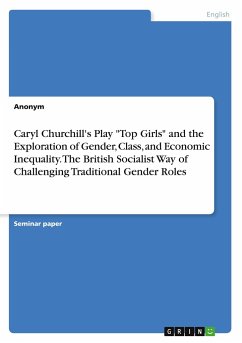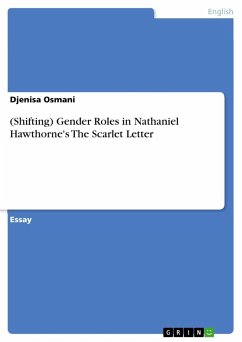Seminar paper from the year 2022 in the subject English Language and Literature Studies - Literature, grade: 2,0, LMU Munich (Anglistik), course: Britische Literaturwissenschaft, language: English, abstract: In this term paper, the complexities of feminism in the context of the modern workplace constructed by Caryl Churchill will be analyzed in order to answer the question of how Caryl Churchill's play ¿Top Girls¿ explores the intersections of gender, class, and economic inequality, and how it challenges traditional gender roles and expectations, particularly within the context of socialist feminism? Hence, this paper will analyze Churchill's play in six sections, offering an historic outlook of British socialist feminism, analyzing the scenes by examining its use of language as well as characterizing the protagonists before looking at the relationship between men and women and the play¿s portrayal of sexuality. Feminism has been a crucial social and political movement in the modern world, advocating for women¿s rights and gender equality. The emergence of feminism as a major theme in 1970s drama was due to the growing momentum of women's rights movements worldwide. Plays written during this period were heavily influenced by the feminist movement, which led to changing attitudes towards gender, power and sexuality. The dramas of the 1980s were characterized by a significant emphasis on feminist themes, reflecting the growing importance of the feminist movement during that period. Female characters were often portrayed as strong, independent, and capable individuals who challenged traditional gender roles and stereotypes. Churchill's play "Top Girls" is a landmark work in the world of feminist literature, exploring issues such as gender, power, and class in a thought-provoking and innovative way. First performed in 1982, the play is set in Thatcher's Britain and follows the story of Marlene, a high-flying career woman who has just been promoted to managing director of the Top Girls employment agency. Through a series of imaginative and surreal scenes, Churchill creates a portrait of a society in which women are struggling to break through the glass ceiling and achieve success in a male-dominated world. Throughout the play, Churchill challenges traditional gender roles and explores the tensions between feminism and capitalism. The character of Marlene, with her ambition and drive, is a fascinating study of a woman trying to succeed in a world that is not always welcoming to her.
Hinweis: Dieser Artikel kann nur an eine deutsche Lieferadresse ausgeliefert werden.
Hinweis: Dieser Artikel kann nur an eine deutsche Lieferadresse ausgeliefert werden.








